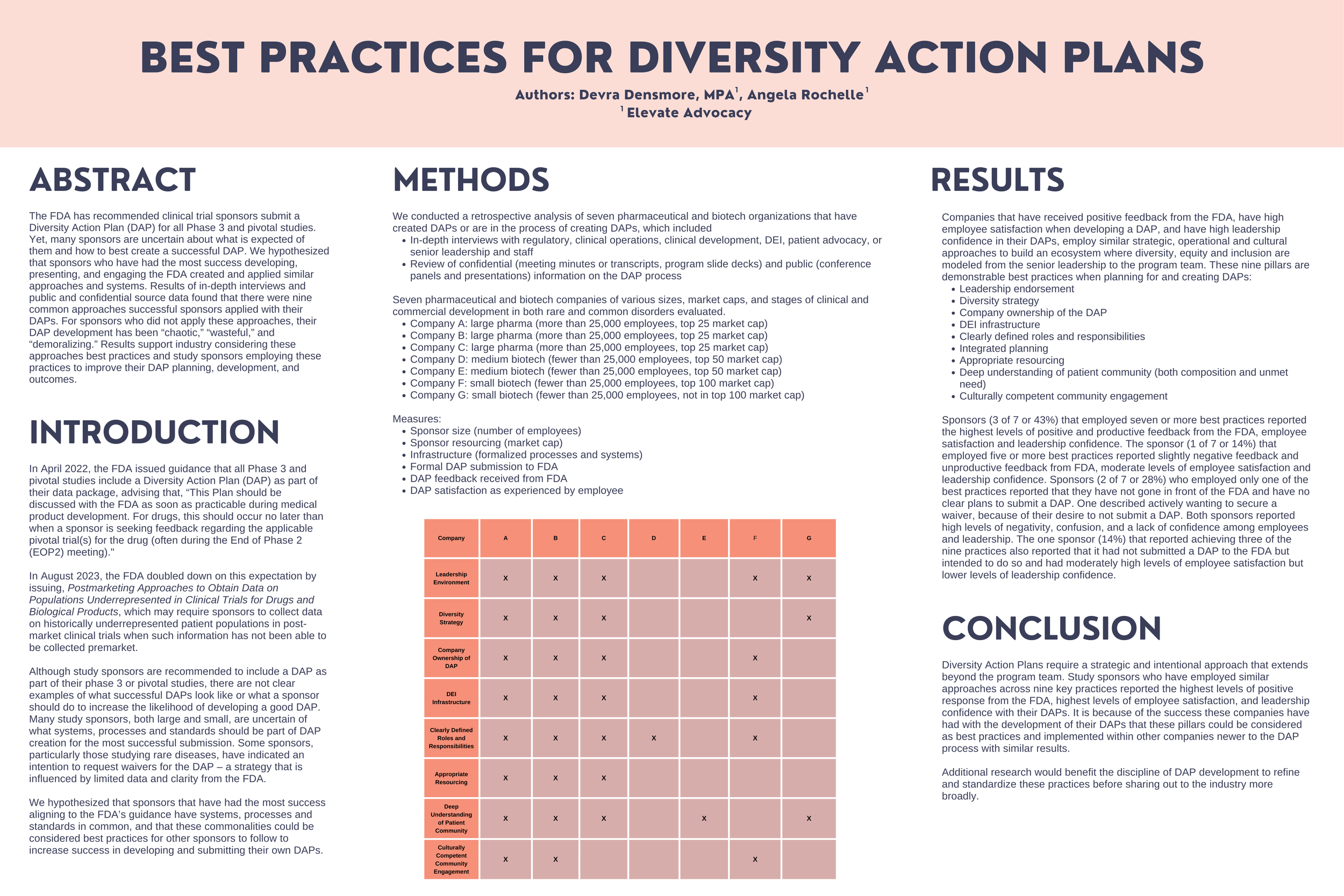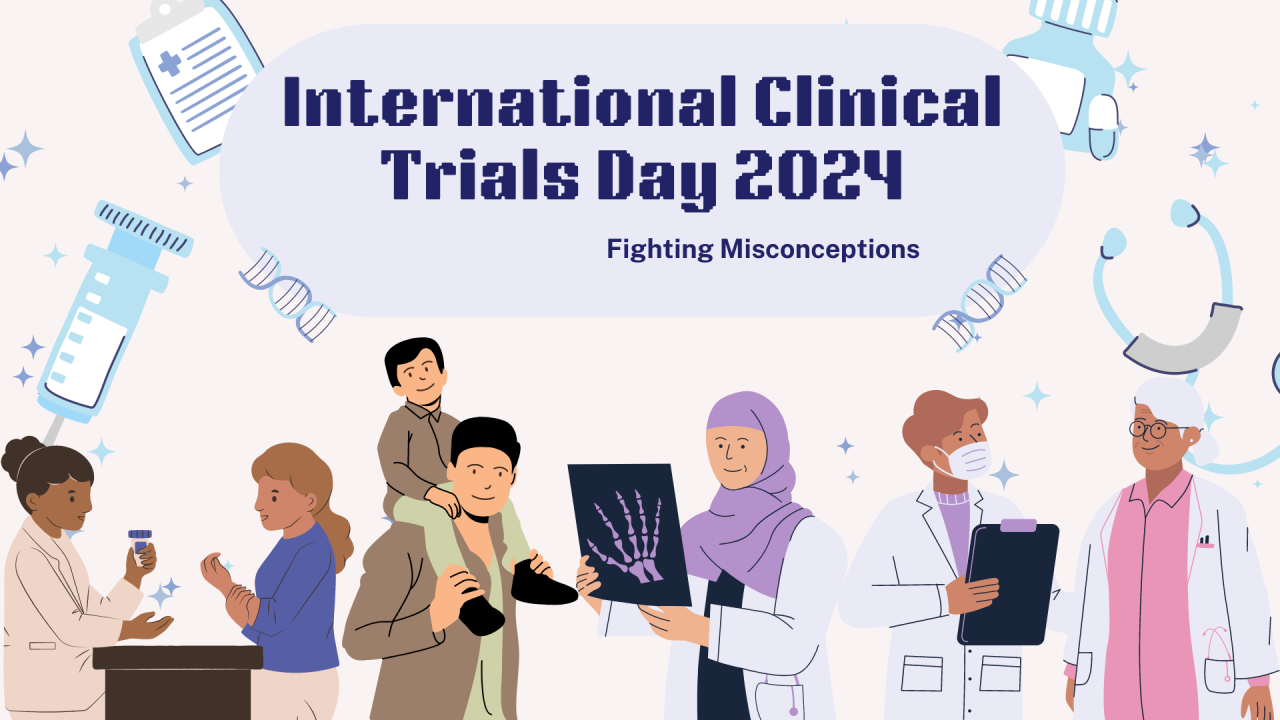
Posters & Articles
Conference Posters
-

Patient Review of Informed Consent Form as Best Practice in Clinical Trial Design
The informed consent form (ICF) is one of the most important documents in a clinical trial, because it contains all essential and relevant information on both what will happen within a study and what is expected and provided to a study participant. However, rigorous reviews by members of the patient population being studied are not done consistently in the study design and development process.
Engaging patients and advocates who are both trial naïve and have had experience in clinical trials in the review process can improve and optimize a patient-facing document, like an ICF, to ensure that it is understandable and facilitates truly informed consent by a study participant.
Elevate Advocacy, in partnership with one of its sponsor clients, facilitated three separate reviews of a study informed consent form (ICF) by three global patients and advocates with different demographic backgrounds and experiences with post-kidney transplant complications. Although the three reviewers were from different countries, racial and ethnic backgrounds, socioeconomic statuses, levels of education and health literacy, trial experience (e.g., naive vs experienced), sexes, and ages, a majority of their comments and suggestions were independently aligned.
-

Best Practices for Diversity Action Plans (DAPs)
The FDA has recommended clinical trial sponsors submit a Diversity Action Plan (DAP) for all Phase 3 and pivotal studies. Yet, many sponsors are uncertain about what is expected of them and how to best create a successful DAP. We hypothesized that sponsors who have had the most success developing, presenting, and engaging the FDA created and applied similar approaches and systems.
Results of in-depth interviews and public and confidential source data found that there were nine common approaches successful sponsors applied with their DAPs. For sponsors who did not apply these approaches, their DAP development has been “chaotic,” “wasteful,” and “demoralizing.”
Results support industry considering these approaches best practices and study sponsors employing these practices to improve their DAP planning, development, and outcomes.
-

Rethinking Stakeholder Mapping for Improved Rare Disease Clinical Trial Experiences and Outcomes
There is little margin for error in rare disease studies. Trial sites and sponsors sometimes struggle to minimize the burdens placed on participants to improve the study design and increase the probability of retention and study success. Historically, literature on clinical trial stakeholder mapping has focused on the relationship between the participant, study principal investigator, sponsor or sponsor’s contract research organization (CRO), and the study coordinator. This relationship model omits two key stakeholder groups, community-based organizations (CBOs) and patient advocacy groups (PAGs).
Our objective was to understand common trial participant burdens in rare disease trials and evaluate if broader stakeholder mapping could address some, most or all those challenges when applied to multiple case studies in different rare diseases. We found that more inclusive stakeholder mapping provides strategic and operational value by identifying potential partners who can create an ecosystem of support that addresses many of the most common causes for high burden of participation by clinical trial participants and their care partners.
Articles
-

Operationalizing A Diversity Action Plan That Makes An Impact | Clinical Leader
Although creating an ecosystem of support for a diversity action plan (DAP) is a critical first step, it is paramount that the plan drive representation within clinical research by its operationalization. No amount of infrastructure can fix a plan that is not a clear map detailing how a sponsor and its partners will attempt to reach articulated enrollment goals that align with epidemiology and the disproportional impact some populations experience within that disease state. Therefore, every DAP should use the following statement from the revised guidance to influence its development, measurement, and improvement and every program team should anchor to this standard.
-

Diversity Action Plan (DAP): Creating An Ecosystem For Success | Clinical Leader
Diversity Action Plans (DAPs) are a hot topic in the clinical development process, particularly now that the FDA released in June 2024 its revised guidance, Diversity Action Plans to Improve Enrollment of Participants from Underrepresented Populations in Clinical Studies. This updated draft provides a much more robust blueprint for what is expected from clinical study sponsors. What is missing, however, and what some sponsors have not yet realized, is that DAPs do not exist in a vacuum. The most successful plans are developed within an ecosystem that lends itself to supporting new and ambitious ways to engage study participants who have historically not been part of clinical research but who have been disproportionately burdened by disease.
-

International Clinical Trials Day 2024: Fighting Misconceptions | LinkedIn
Elevate's own Grayson Schultz attended the Health Equity in Clinical Trials Congress in Atlanta in early May, where a recurring theme emerged and was challenged repeatedly: the misconception that certain communities are unwilling to participate in research.
-

Considering The Patient Experience Is Critical To Creating A Successful ICF | Clinical Leader
An informed consent form (ICF) is one of the most important documents a sponsor can produce for their clinical studies. For many study participants, it is their introduction to clinical research and the first information they have about the study. For every study participant, it is also the road map for what they can expect when enrolling in a study, and it serves as the gate between the participant and the study itself. Whether that gate is opened is often determined by whether the participant understands and feels comfortable with what is contained in the ICF.
-

Developing A Diversity Action Plan That Actually Works | Clinical Leader
In April 2022, the FDA issued guidance that all Phase 3 and pivotal studies include a Diversity Action Plan (DAP) as part of their data package. The guidance advised that, “This Plan should be discussed with the FDA as soon as practicable during medical product development. For drugs, this should occur no later than when a sponsor is seeking feedback regarding the applicable pivotal trial(s) for the drug (often during the End of Phase 2 (EOP2) meeting).” This recommendation has since been codified by Congress in Title III of the Food and Drug Omnibus Reform Act of 2022, which requires drug and device sponsors to submit DAPs articulating “goals for increasing enrollment of subjects from historically underrepresented populations.”
Let’s connect
Have a challenge?
We are eager to hear from you.
Not sure where to start?
We can help connect the dots.


